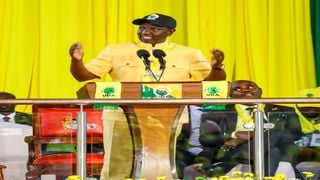
President William Ruto addressing delegates during the UDA National Governing Council meeting at the Bomas of Kenya in Nairobi on September 29, 2023.
| Wilfred Nyangaresi | Nation Media GroupOur Columnists
Premium
Hail Hustler, but ‘Voodoo Politics’ spells doom for Kenya’s future
Class politics swept Kenya’s Fifth Republic led by President William Ruto to power. Once enthroned, the emotive ‘hustler-dynasty’ pseudo-scientific narrative is quickly morphing into a new genre of ‘voodoo politics.’ Claiming to provide deceptively simple and seemingly ‘magical’ solutions to Kenya’s post-Covid polycrisis, in reality voodoo politics is pushing the country to the ropes.
In public governance, Nairobi has adopted a funding model for university and college education, which puts students into pseudo-scientific categories — ‘Vulnerable’; ‘extremely needy’; needy and ‘less needy’ — stoking a public clamour for a ‘needometer’ to accurately measure degrees of ‘neediness’ while ensuring justice and fairness.
Voodoo politics has its Siamese twin in ‘voodoo diplomacy’. In regard to Haiti, the Ukraine war and Israel-Hamas conflict, Kenya is blowing hot and cold, playing the diplomacy of “strategic ambiguity” to benefit from all sides to the conflicts. Prioritising a scientific approach to drive evidence-based policy-making is central to countering voodoo politics as a threat to effective diplomacy and governance.
For the Kenyan police officers and commanders en route to Haiti, I recommend a must-read book: Voodoo Politics: The Clinton/Gore Destruction of Haiti (October 15, 2000) by Canadian pilot and political adviser, Lynn Garrison.
Voodoo connotes a form of religion practiced in parts of the Caribbean, especially Haiti, blending “elements of Roman Catholic ritual with traditional African magical and religious rites, and often characterised by sorcery and spirit possession”. As such, ‘voodoo politics’ shares genealogical traits with ‘Voodoo economics’, a term George H.W. Bush coined to deride President Ronald Reagan’s economic policies in 1980, widely perceived as unrealistic and ill-advised. “Like ‘voodoo economics’, voodoo politics describes policies that seem overly ambitious, unscientific and whimsical.
Kenya’s power elite has courted voodoo politics as deceptively simple, almost ‘magical,’ solution to the great post-Covid distress, confusion and suffering, rising cost of living, debt, currency on a free-fall and spiraling crime. Despite Kenya’s voodoo moment, many citizens still believe in evidence-based policy-making as a sustainable path to peace, development and effective diplomacy.
This week, I was at three different events from which I drew three lessons of counter-balancing the impact of voodoo politics.
First lesson: While peace is a rare commodity in our world, Voodoo politics is a real threat to peacebuilding — the talk to repair relationships, reform institutions and build bridges across ethnic, religious, class, and racial divides.
Voodoo politics poses a real threat to peacebuilding as the art of managing diversity. Setting up a Special Commission and a Panel of Eminent Persons will aid the implementation of Kenya’s architecture of peacebuilding. Further, developing a curriculum around Chapter six of the 2010 Constitution on “Leadership and Integrity” will produce the Kenya(n) we want. Finally, creating a peace support agency along the lines of South Africa’s African Renaissance and International Cooperation Fund can enhance cooperation between Kenya and other countries, particularly African.
Second lesson: voodoo politics, naturally, begets voodoo diplomacy. I was a panelist on the morning show on diplomacy, security and geostrategic issues hosted by KTN bringing together captains of Kenya’s emerging think tank industry. Conversations were on impact of the Ukraine war, Kenya’s mission to Haiti and the Israel-Hamas War on Kenya’s diplomacy.
Kenya is playing diplomacy of “strategic ambiguity” to benefit from both Russia and Ukraine. Kenya was the only country in the East Africa Community trade bloc to impetuously criticise Russia as other member states stayed quiet. But in a remarkable volte-face, in April 2023 Kenya received the Foreign Affairs Minister Sergei Aleinik of Belarus, Russia’s ally, and received Russia’s Foreign Minister Sergey Lavrov in May 2023.
In September, on the sidelines of the UN General Assembly in New York, President Ruto met Ukraine President Volodymyr Zelenskyy and pledged to support Ukraine.
On Haiti, the UN Security Council approved the deployment of 1,000 Kenyan police officers to Port-au-Prince. But the captains of Kenya’s foreign policy are seemingly extending the peace and security mandate of the 1,000 from curbing gang violence to “rebuilding of Haiti – its politics, economic development and social stability”, according to former Foreign Affairs Minister Alfred Mutua in a post on his X account. The result is a tragic erosion of Kenya’s credibility and trust in the global arena.
Lastly, in regard to the Israel-Hamas war, Kenya is been blowing hot and cold, struggling to reconcile its condemning of Hamas attack as terrorism and solidarity with Israel with the African Union’s position that avoids labelling acts of violence by Palestinians as terrorism and pushing for a two-states solution.
The third lesson is that policy research must drive evidence-based policy-making to realise sustainable peace and development, and an effective foreign policy.
- Prof Peter Kagwanja former Government Adviser (2007-2013), and currently Chief Executive at the Africa Institute and Adjunct Professor at the University of Nairobi and National Defence University (NDU).





